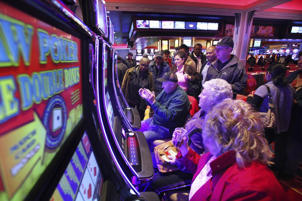UP NEXT
Some state lawmakers are weighing whether to expand casino gambling across North Carolina, another potential dramatic expansion of wagering in the state.
A House-passed mobile sports gambling bill is already awaiting Senate action, and the chamber could soon consider allowing video lottery terminals statewide and even full casinos outside of Native American tribal land. Revenue from video gaming machines in bars and restaurants and casinos would dwarf the amount of money expected to be raised by mobile sports gambling.
“I keep hearing from them [Senators] that they want to take up VLTs and potential sites in Eastern North Carolina for casinos,” Rep. Jason Saine, a Lincoln County Republican, told WRAL on Friday.
There are three casinos in North Carolina, two Eastern Band of Cherokee Indian casinos located in the far-western part of the state and a Catawba Indian casino on Interstate 85 near the South Carolina border.
“I’ve heard folks talk about it for years in Eastern North Carolina: Why is there just a casino in the western part of the state?” said Sen. Jim Perry, a Republican from Lenoir County. “There are a bunch of jobs. I’d be willing to have that conversation with somebody.”
A recent analysis of gambling in North Carolina studied the impact of three standalone casinos in Anson, Nash and Rockingham counties. It found that gross gaming revenue from those three casinos, if they were the only expansion of gambling in the state, would exceed $1.6 billion on an annual basis.
Senate leader Phil Berger represents Rockingham County. The Catawba Two Kings Casino is located in House Speaker Tim Moore’s district.
The analysis was commissioned by Greater Carolina, a nonprofit political education organization that bills itself as a coalition of “forward thinking, pro-free market conservative leaders.” It was released in late March.
The House-passed budget included no mention of casinos. The Senate has yet to release its two-year budget plan for the fiscal year beginning July 1. The budget often includes policy proposals.
Medicaid expansion in the state, a top priority of Democratic Gov. Roy Cooper, is contingent upon passage of the budget. But the more controversial topics that get added to the budget, the less likely it becomes to pass.
Republicans hold veto-proof majorities in both chambers after a Democratic House member switched parties last week. But a GOP supermajority doesn’t necessarily guarantee support for casinos. While many issues at the legislature break down along party lines, gambling does not. It has strong opponents, as well as strong supporters, in both political parties.
Senate leaders have been tight-lipped about what will or won’t be in their budget proposal — including the question of whether it might contain language allowing more casinos to be built.
“The Senate will begin its internal budget work next week, with plans to roll the budget out in mid-May,” said Lauren Horsch, a Berger spokeswoman, in an emailed statement. “No decisions have been made about what will or will not be in the budget.”
Republicans have gradually cut tax rates over the past decade and in the most recent budget approved a plan to completely eliminate corporate taxes by 2030, as well as lowering the personal income tax rate further. This year, given the state’s budget surplus, some Republican lawmakers have pushed for speeding up those planned future tax cuts.
Tax revenue from additional forms of gambling could be used to offset lower tax rates.
“I know they [the Senate] always want bigger tax cuts,” said Saine, senior chairman of the House Appropriations Committee. “If you want bigger tax cuts, you have to offset that revenue from somewhere.”
Saine said he had not seen the Senate’s budget proposal and was not speculating on what his colleagues in that chamber planned to do. Perry said there have been no discussions as a caucus about gambling issues this year.
The market analysis found three casinos could generate between $336 million and $589 million annually in tax revenue for the state, depending on the tax rate. VLTs could bring in even more with nearly $1.9 billion in revenue from 30,000 terminals across the state. With more than 56,000 terminals, that revenue would jump to $3.79 billion.
This year the state is expecting to bring in about $33.2 billion in revenues — most of it from income taxes on people and businesses.
Rep. Harry Warren, a Rowan County Republican, introduced legislation this session to legalize terminals. House Bill 512 would allow at least six and up to 10 terminals per location with merchants that have off-site or on-site ABC permits. The bill has yet to receive a hearing in the House and has no other sponsors.
Virginia lawmakers and voters approved in 2020 casinos in four southern Virginia cities: Danville, Bristol, Norfolk and Portsmouth. Danville is just over the North Carolina border, north of Rockingham County. Portsmouth and Norfolk are also driveable from parts of North Carolina.
The market analysis found a potential leakage to Virginia of $259 million in gross gaming revenue.
“You see these casinos going up on our borders,” Saine said. “People are going to these destination spots. It employs a lot of people. That’s got to be attractive to members in those areas who see it as a tremendous opportunity for economic development.”
Mobile sports gambling is legal in Virginia and Tennessee. House lawmakers passed House Bill 347 to allow mobile sports wagering in North Carolina last month. Proponents of the sports wagering legislation do not want to add other forms of gambling to that bill.
